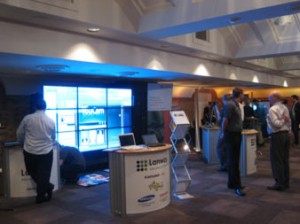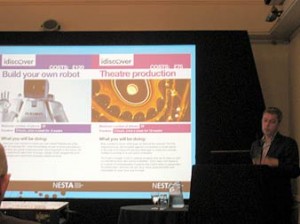
The conference exhibition allowed companies to showcase their products
Today marked the beginning of the Handheld Learning 2009 conference, which focuses on the use of handheld and mobile technology in the education sphere. Liz and I attended the first day of the conference, which was open to the general public (a category that we ourselves fit into in this context). We attended a couple of the presentations, along with talking to many of the exhibitors there in an attempt to find some new products worth highlighting for you here on Future Conscience.
Overall, the first day of the exhibition had some interesting content – particularly in the presentations. However, there was something about some of the exhibitors that felt a bit out of date. When we are talking about a conference that aims to focus on the cutting edge, some of the displays were very underwhelming. There was one in particular that showcased some rudimentary augmented reality technology that was straight out of five years ago. Others had education-level licensing costs associated with them, which raises eyebrows when similar things can be done with publicly available software applications that are upwards of 90% cheaper to purchase.
Having said this, the conference showed that the education sector is thinking very seriously about the future of how we learn and there were a few initiatives and products in particular that we thought deserved to be showcased here on Future Conscience. So, let me present to you the three that impressed us the most – with two runner-ups and a ‘grand’ prize going to one initiative.
Runner-Up: CapturaTalk – a software application that utilises Optical Character Recognition (OCR), very impressive high-quality voice synthesis and integration with the Oxford English Dictionary.
By using the three together, the software allows a user of a Windows Mobile device to capture an image of any text, have it instantly coverted and spoken out loud by the software, and even allows them to then highlight words that they do not understand and have a dictionary definition provided (also read aloud).
The software can also be used to read out any digital text, such as emails or essays. The software was developed specifically to help children with learning disabilities such as dyslexia, however the wider uses of the package for people with poor eye-sight or adult illiteracy are easy to see.
Runner-Up: Wild Knowledge – software package that allows users to create and share interactive forms, maps and images/video on mobile devices in a collaborative workflow. The package has been specifically designed for educational use, and at the moment is being showcased for use in identifying wildlife and coordinating field-trips to venues such as the zoo or an aquarium. The true power of this software package comes from the fact that it gives teachers the ability to create custom designed PDA tours of excursion destinations, along with the ability for students to add to this content with their own observations as they move around the environment which are then shared collectively with the others participating.
This flexibility, coupled with a very affordable annual price point, really highlight the real-world practical nature of Wild Knowledge. Students will be more engaged through the use of PDA-type devices, will be capable of collectively sharing the knowledge they find when in separate groups (with GPS location markings if the device supports GPS), and most importantly the teacher/s are able to completely customise the content through an easy interface.

The presentation from NESTA had some truly inspiring ideas
First Place Winner: iDiscover by NESTA. We decided that the first place showcase would go to an initiative rather than a product for a number of reasons. The presentation given by the National Endowment for Science, Technology and the Arts (NESTA) focused on a new education initiative that they were in the process of rolling-out on a larger scale which they called iDiscover.
This initiative is essentially a large selection of short courses aimed at younger students, allowing them to develop skill-sets that interest them and are incredibly practical for the emerging innovation based economy. Although in its very early stages (and indeed, a quick search for iDiscover shows that they have some serious branding issues to contend with if they decide to launch on a large scale), the thinking behind the initiative is in our minds absolutely spot on and should really be commended for focusing on exactly the right issues.
Essentially, the program will attempt to create environments of learning (that run parallel to the regular education system) that allow young students the ability to focus on subjects of their choosing, and then to develop self-learning and collaborative skills whilst under the supervision of an educational mentor. It seeks to explore a possible shift in the education system as a whole, where teachers are more facilitators of self-determined learning and allow students to truly develop to their strengths.
In addition to this, the initiative will seek to provide courses that offer very relevant and practical education for various career streams of the future. This shift towards a 21st century model of education, even though at its very early stages, is something that is sorely needed if we are to have any chance of facing pressing issues such as climate change and an aging population average.
Overall, we were very glad to attend the public aspect of the Handheld Learning conference (and were also sorry to be unable to attend the awards event this evening!). The conference continues for the next two days, and indeed many of the sessions will be accessible online afterwards in some form. The real ‘meat’ of the conference, so to speak, comes in these two days and we are really looking forward to hearing about some of the content that will emerge from these seminars – but it was good nonetheless to get somewhat of an idea of where education is heading in the very near future.
[ad name=”Google Adsense-Link Banner x4″]

![[Review] Superhuman: Exploring Human Enhancement at the Wellcome Collection Superhuman - Exhibition Photo](https://www.futureconscience.com/wp-content/uploads/2012/09/Superhuman-Exhibition-Photo-150x150.jpg)
![[Review] Propaganda: Power and Persuasion Propaganda Due](https://www.futureconscience.com/wp-content/uploads/2013/09/propaganda2-150x150.jpg)
![[Review] Brains: The Mind as Matter - Wellcome Collection exhibition Brains QR code](https://www.futureconscience.com/wp-content/uploads/2012/06/BrainsQR1-150x150.jpg)
